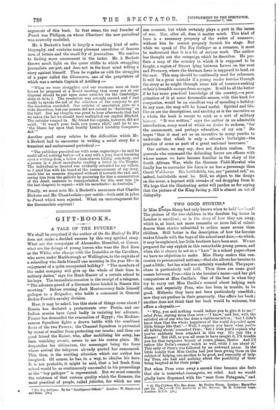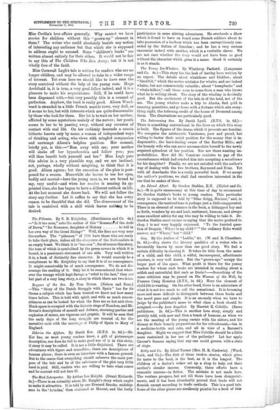TWO GOOD STORIES.* e
Is' Miss Evelyn Sharp had only known when to hold her band!
The picture of the two children in the desolate big house in London is excellent; so is the story of how they ran away, which is, at least, not more romantic or more full of coinci- dences than stories submitted to critics more severe than children. Still better is the description of how the heroine makes friends with the boys of the school next door,—to which, it may be explained, her little brothers have been sent. We are prepared for any exploit in this remarkable young person, and when she is chosen to act as a " hare " in a school paper-chase we have no objection to make. Miss Sharp makes this con- cession to preconceived notions,—that she allows her heroine to pant a little; but her wind was certainly wonderful. The paper- chase is particularly well told. Then there are some good scenes between Prue—this is the heroine's name—and her girl companions at Miss Cecilia's. One of the best is when they try to carry out Miss Cecilia's counsel about helping each other, and especially Prue, who has been in trouble, to be good. Hitherto they have not been particularly unselfish ; now they are profuse in their generosity. One offers her book ; another does not think that her book would be welcome, but offers a chrysalis :— " Why, you said nothing would induce you to give it to me !' cried Prue, staring more than ever.—' I know,' said Dot, with the satisfied air of one who has done a righteous action; but I didn't know then that the whole happiness of the world depended upon little things like that.'—' Well, I suppose you know what you're all talking about,' remarked Prue; but I wish you'd explain why you've suddenly been attacked in this way. It's just like a disease ! But still, as you all seem to have caught it, I'll trouble you for that turquoise brooch of yours, please, Hester. And I'd rather like Delia's enamel watch as well, while I am about it.' This sally of Prue's was followed by an awkward pause. In the little homily that Miss Cecilia had just been giving them on the subject of helping one another to be good, and especially of help- ing Prue, she had said nothing about the possibility of their being laughed at for their pains."
But when Prue runs away a second time because she feels that she is somewhat incomprise, we rebel. And we would gladly have dispensed with the "man from Patagonia," and • (1) The Children Who Ran Away. By Evelyn Sharp. London: Macmillan aid Co. Ne..]—(2) The Anehoress of Ste. Maxims. By H. Cornwall Legh. London: JL2.S.[26.1 Miss Cecilia's love affairs generally. Why cannot we have stories- for children without this " grown-up " element in them P The writer who could absolutely baniah any notion of interesting any audience but that which she is supposed to address ought to succeed. Some "children's books" are written almost entirely for their elders. It would not be fair to say this of The Children Who Ran Away; but it is not wholly free of the fault.
Miss Cornwall Legh's tale is written for readers who are no longer children, and may be allowed to take in a wider range of interest Yet even here we should like to have seen the story contrived without the help of the young man. Hugo Archibald is, it a true, a very good fellow indeed, and it is a pleasure to make his acquaintance. Still, if he could have been dispensed with,—but very possibly this is a counsel of perfection. Anyhow, the book is really good. Alison Wood- ward is stranded in a little French seaside town, very dull, as it seems to her, but with interests which are quite discoverable by those who look for them. Her lot is to wait on her mother, afflicted by some mysterious malady of the nerves ; her youth seems to her to be passing away, without any occasion of contact with real life. On her suddenly descends a cousin hitherto known only by name, a woman of independent ways of thinking and acting, who views with mingled compassion and contempt Alison's helpless position. Her counsel, briefly put, is this :—" Run away with me; your mother will shake off her hypochondria and follow you ; you will thus benefit both yourself and her." Miss Legh puts this advice in a very plausible way, and we are inclined, not, perhaps, wholly without misgiving, to think that it is good. Alison agrees ; but the execution of the plan is post- poned for a season. Meanwhile she learns to use her eyes, bodily and mental—here the young man is, we are bound to' say, very useful—and when her resolve is nearing its ap- pointed time, she has begun to have a different outlook on life. At the last moment she draws back. We will not follow the story any further. Let it suffice to say that she has every reason to be thankful that she did. The denouement of the tale is contrived with a skill which leaves nothing to be desired.































































 Previous page
Previous page